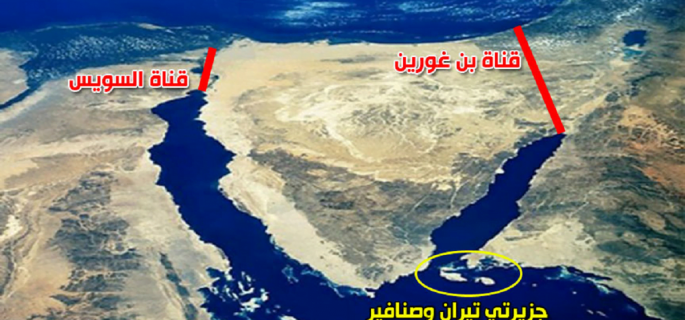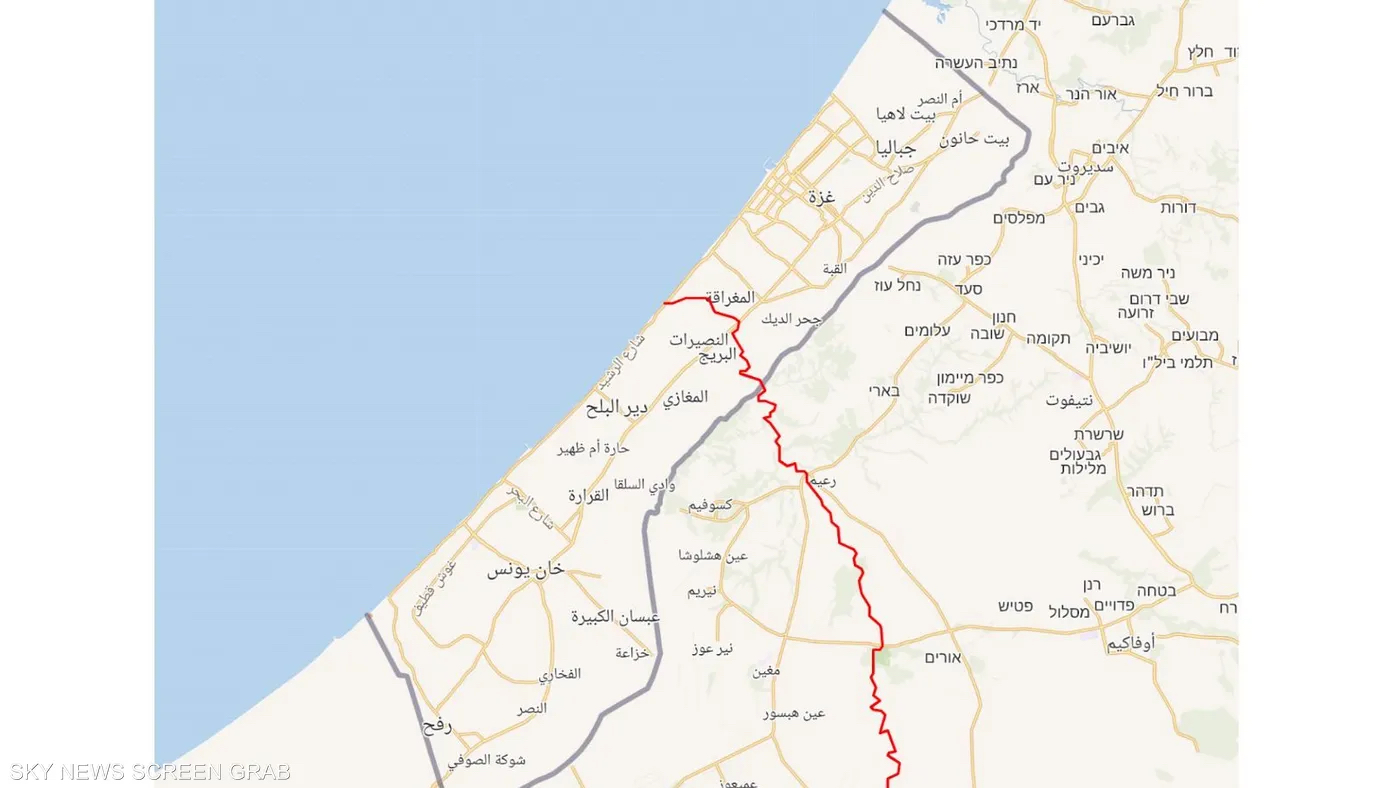Behind the veil of security and political justifications, there are economic motives and major interests that determine whether a war is a profitable ‘investment’ in the long run, or whether it will result in a ‘loss’, with no return on money being poured into arms.
The war on Gaza, in particular, could serve as a model for the above idea. In addition to the trillions worth of gas wealth in the besieged Strip, there is an incredibly ambitious project that Israel cannot realize unless it exerts complete control over Gaza.
In addition to the trillions worth of gas wealth in Gaza, there is an incredibly ambitious project that Israel cannot realize unless it has complete control over Gaza–an Israeli alternative to the Suez Canal serving as a conduit between Asia and Europe
An old plan awaiting the opportune moment
In 1993, the US government declassified a memorandum dating back to 1963 that contained correspondences with the Israeli government, discussing the possibility of digging an Israeli maritime canal connecting the Red Sea to the Mediterranean – a conduit between Asia and Europe. The proposed project was named the ‘Ben Gurion Canal’, after the founder of Israel.
Recently, discussions about the canal have resurfaced, alongside claims or theories suggesting that it might be one of the primary reasons for Israel’s attack, and clearing, of Gaza. According to a recent study published by Civil Daily on November 13, "Israel’s aspirations to gain full control over the Gaza Strip and eliminate Hamas may be linked to an ambitious economic opportunity—the creation of the Ben Gurion Canal Project."
During an emergency session on October 19, 2023, Mustaphafa Bakri, a member of the Egyptian House of Representatives, indicated that the objective of depopulating Gaza is to clear the route for the Ben Gurion Canal. The proposed canal would stretch from Eilat, on the Red Sea, to Gaza, on the Mediterranean, and compete with the Suez Canal and challenge China’s Belt and Road Initiative.
In 1993, the US government declassified a memorandum dating back to 1963 discussing digging an Israeli maritime canal connecting the Red Sea to the Mediterranean– a conduit between Asia and Europe, named the ‘Ben Gurion Canal’, after the founder of Israel
Bakri’s remarks mirror those laid out in the US memorandum 60 years prior, which focuses on the "direct transformative impact" of proposed project “bypassing the Suez Canal” rather than on its economic benefits to Israel.
 The Suez Canal (left, marked in red), and the proposed Ben-Gurion Canal (right, marked in red), linking the Red Sea to Mediterranean crosses the Gaza Strip
The Suez Canal (left, marked in red), and the proposed Ben-Gurion Canal (right, marked in red), linking the Red Sea to Mediterranean crosses the Gaza Strip
Why Gaza?
The plans for the canal, as revealed in the declassified correspondences, were prepared by the Lawrence Livermore National Laboratory in California, a federally funded research center, in collaboration with the US Department of Energy. The initial plans proposed burying 520 nuclear bombs with specific characteristics and power, and detonating them to assist in the excavation process in the hills of the Negev Valley. This was to expedite the process, which would otherwise take many years using traditional methods and heavy machinery.
The proposed length surpasses that of the Suez Canal by over 100 kilometers, according to the old plans and initial project outline. This is primarily due to the nature of the terrain.
However, circumstances have changed since the 1960s. Present day laws, international agreements and environmental considerations mean that it is no longer feasible to use 520 nuclear bombs to clear the road. Enter: Gaza Valley, a perfect alternative solution.
Present day laws, international agreements and environmental considerations mean that it is no longer feasible to use 520 nuclear bombs to clear the road. Enter: Gaza Valley, a perfect alternative solution
Stretching 80 kilometers with a basin area of 3,400 square kilometers and featuring suitable natural terrain, this valley, where many freshwater springs flow in southern Palestine, is considered an ideal and ready-made solution for digging the canal. If Israel passes the canal through this valley, its route would be significantly reduced, thus saving costs and time, given its strategic location and geographical characteristics.
An existential threat to Egypt
If the project goes forward, existing global trade dynamics will be challenged. Egypt has had a central role in maritime trade, thanks to the Suez Canal, a revolutionary force in global trade since its opening in 1869.
For this competition to hold weight, the new canal must outperform and surpass the Suez Canal in its specifications. Initial plans dating back to the 1960s documented that the Ben Gurion Canal should be ten meters deeper and 200 meters wider than the Suez Canal. This would allow ships to move in both directions, overcoming the major drawback of the Suez Canal, which only permits one-way traffic.
It would deal a blow to the already struggling Egyptian economy. In a statement released in June 2023, Osama Rabie, head of the Suez Canal Authority (SCA), stated that the revenues from the canal reached $9.4 billion during the fiscal year 2022-2023, the highest in its history, accounting for about 14% of the national budget for that year.
 The proposed Ben-Gurion Canal (marked in red), linking the Red Sea to Mediterranean and crossing through the Gaza Strip
The proposed Ben-Gurion Canal (marked in red), linking the Red Sea to Mediterranean and crossing through the Gaza Strip
Financial and political challenges
Regarded by some Israeli experts as the most important development since the establishment of Israel, in terms of infrastructure and global positioning and influence, the current estimated cost of the Ben Gurion Canal is $100 billion.
Financial considerations are not the only factor preventing the project's realization. There is also the security challenge presented by the Palestinian resistance, in all its forms and factions, regardless of whether the canal crosses through the Gaza Valley or its periphery. Resistance might result in transport companies viewing the route as ‘unsafe’, in addition to the legal implications of crossing through occupied territory.
If the project goes forward, existing global trade dynamics will be challenged. Egypt has had a central role in dominating the world's shortest maritime trade route–the Suez Canal, a revolutionary force in global trade since its opening in 1869
In an article published by Wadi Press on November 11, Dr. Ali Dreij suggests that the American-backed Israeli project is motivated by the United States’ need to curb China’s economic rise and influence, and thwart its Belt and Road initiative, which aims to build a railway line connecting China's western provinces to West Asia and secure waterways around the world.
According to the article, the United States seeks to compete with China's trade route by creating an alternative. A new phase of the conflict will see an economic war fighting for control of seaports and global trade routes.
Mohammad Saqer, Engineer and former head of the Aqaba Special Economic Zone Authority (ASEZA) in Jordan, tells Raseef22 that although, technically speaking, the project is feasible, it is contingent on the outcome of the current war in Gaza.
Transport companies and commercial vessels will not risk crossing an unsafe canal, even if it offers better facilities, lower prices, or possesses higher technical specifications. Saqer explains, “Whether the canal passes through Gaza Valley or its periphery, Israel will still have a major problem called the Suez Canal. The companies and their nationalities must also be taken into account. Countries like Iran, Venezuela, and those boycotting will not use the new canal simply because it exists.”
Tiran and Sanafir
The question remains as to whether Egypt conceding the Tiran-Sanafir corridor to Saudi Arabia in 2016 actually served the Ben Gurion Canal project. Was it a precursor to the project, or is the link merely a conspiracy?
Under the Camp David Accords of 1978, all ships, including Israeli ships, had the right to pass through the Strait of Tiran during times of peace. During times of war or emergency, Egypt retained control over the strait.
Now that the Strait of Tiran is no longer under Egyptian sovereignty, after it ceded the islands to Saudi Arabia, resumption of the Ben Gurion Canal project is contingent on transforming the Strait into an unconditional international transit corridor under Egyptian sovereignty.
Netanyahu recently announced a “revolution in the world of transportation in Israel,” which includes a $27 billion national light rail project, coinciding with the announcement of the resumption of work on the Ben Gurion Canal.
Earlier this year, Israeli Prime Minister Benjamin Netanyahu announced what he termed a “revolution in the world of transportation in Israel.” This includes a $27 billion light rail project in Tel Aviv, connecting the northern city of Kiryat Shmona to Eilat in the far south. This announcement coincided with that of the resumption of work on the Ben Gurion Canal.
Considering the Ben Gurion Canal as solely an Israeli project diminishes its significance. Ultimately, a project of this magnitude will reshape global trade dynamics, and its shares distributed among the countries or transcontinental companies capable of financing such ambitious and extensive infrastructure. Its funding will come from international banks with vested interests in creating global competition in supply chain-dependent routes.
If there is a need to curb this project, in addition to its impact on Palestine, Egypt’s role is most crucial. It might be the perfect timing to expand the Suez Canal, to allow ships to pass in both directions, at a significantly lower cost than the Israeli canal and, of course, with easier navigation conditions.
Raseef22 is a not for profit entity. Our focus is on quality journalism. Every contribution to the NasRaseef membership goes directly towards journalism production. We stand independent, not accepting corporate sponsorships, sponsored content or political funding.
Support our mission to keep Raseef22 available to all readers by clicking here!
Interested in writing with us? Check our pitch process here!



